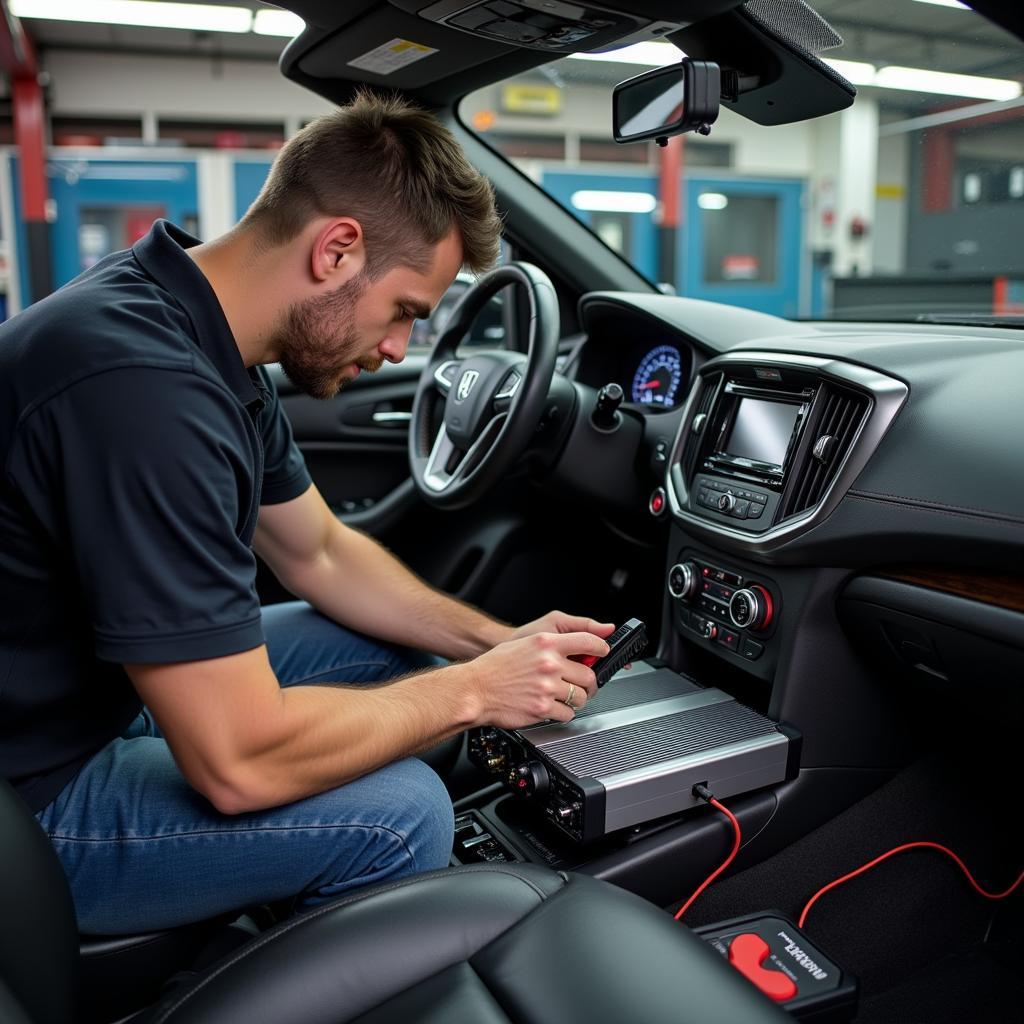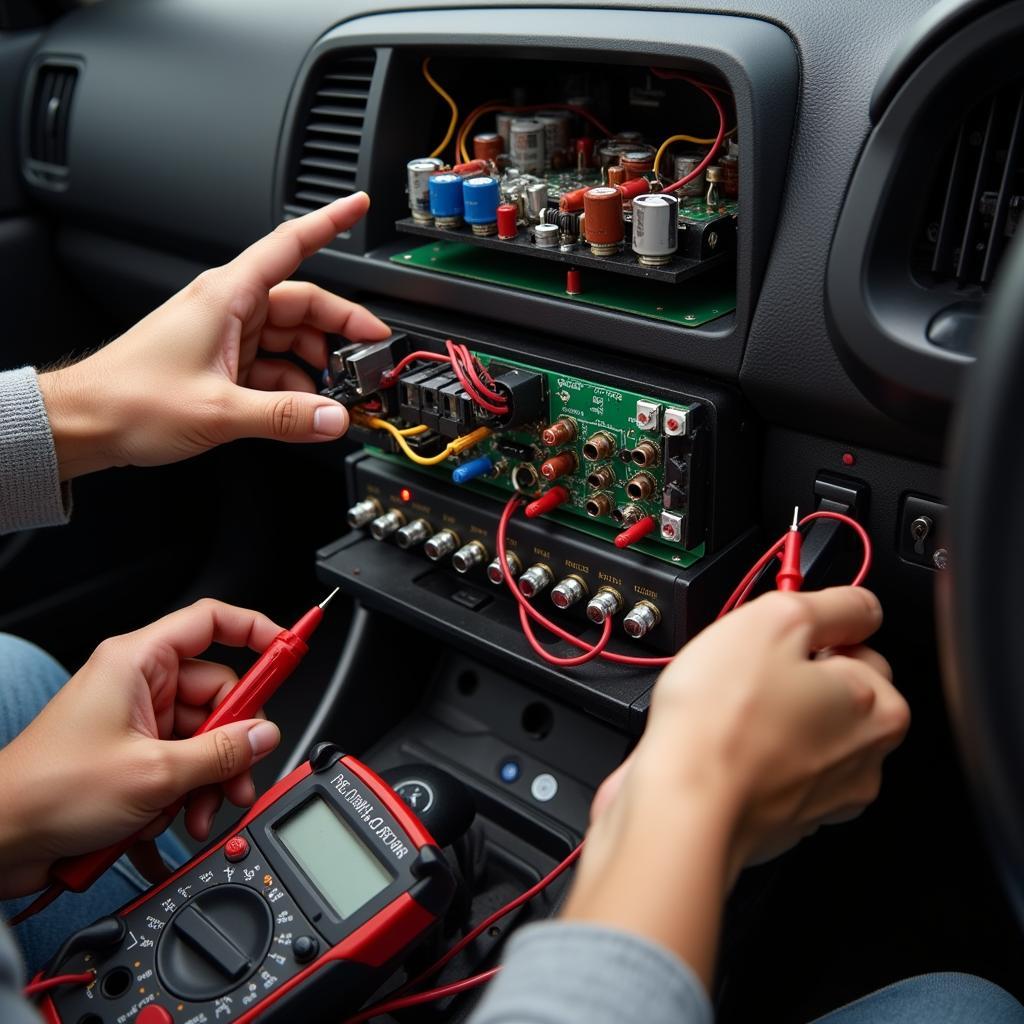If your car audio system is on the fritz, you might be wondering, “Who fixes car amps?” After all, a good sound system is a crucial part of the driving experience for many car owners. Whether you’re an audiophile or just enjoy listening to music on your commute, a malfunctioning amplifier can be a major headache. This guide will walk you through the options for car amp repair and help you get your music back on track.
Who Can Fix My Car Amp?
Several avenues exist for car amp repair, depending on your budget, technical skills, and comfort level:
- Yourself: If you’re comfortable with electronics and have some troubleshooting experience, you might be able to diagnose and fix the issue yourself. Numerous online resources and forums dedicated to car audio can guide you through the process. However, proceed with caution, as working with car electronics can be complex and potentially dangerous if you’re not careful.
- Independent Auto Electrical Specialists: Many independent shops specialize in car electrical systems, including audio. These shops often have experienced technicians familiar with a wide range of car amp brands and models. They can provide a more cost-effective solution compared to dealerships, especially for older vehicles or aftermarket systems.
- Car Audio Installation Centers: Businesses specializing in car audio installation often have technicians on staff who can also repair amplifiers. These shops are a good option if you’re looking for specialized expertise in car audio, particularly for high-end systems or custom installations.
- Dealerships: If your car is still under warranty, the dealership might cover the cost of repairing a faulty factory-installed amplifier. However, dealerships tend to be the most expensive option for repairs outside of warranty coverage, and they may not be as familiar with aftermarket audio systems.
 Car Amp Repair Shop
Car Amp Repair Shop
Common Car Amp Problems and Solutions
Understanding the common reasons car amps fail can help you determine the best course of action for repair:
- Blown Fuse: A blown fuse is one of the simplest problems to fix. Check the fuse connected to your car amp and replace it if necessary. Always use a fuse with the correct amperage rating.
- Overheating: Amplifiers generate heat, and overheating can cause damage. Ensure the amp has adequate ventilation and isn’t covered by anything that could obstruct airflow. If overheating is persistent, the amp itself might have a fault requiring professional repair.
- Distorted Sound: Distorted sound can indicate a problem with the amp’s internal components or a poor connection. Check all the wiring connections to and from the amp. If the connections are secure, the amp itself might need attention.
- No Power: If the amp doesn’t power on, check the power and ground connections. A blown fuse can also cause a loss of power. If those are in order, there might be a problem with the amp’s internal circuitry.
- No Sound: When the amp powers on but produces no sound, check the speaker connections and the head unit’s settings. A problem with the amp’s input signal or output stage could also be the culprit.
Tips for Choosing a Car Amp Repair Service
When selecting a repair shop or technician, consider the following factors:
- Reputation: Look for shops with positive online reviews and testimonials from previous customers. Word-of-mouth referrals from friends or family can also be valuable.
- Experience: Choose a shop with experienced technicians familiar with your car’s make and model and the specific brand of your car amplifier.
- Warranty: Inquire about warranty coverage on both parts and labor. A reputable shop will stand behind its work with a reasonable warranty period.
- Communication: Opt for a shop that communicates clearly and thoroughly explains the problem, repair options, and associated costs.
[how to fix vacuum leak on car](https://autotippro.com/how-to fix vacuum leak on car/)
DIY Car Amp Repair: Proceed with Caution
While some car owners successfully repair their car amps, it’s essential to understand the risks involved:
- Electrical Hazards: Working with car electrical systems can be dangerous if you’re not careful. Always disconnect the negative battery terminal before working on any electrical components to avoid shocks or short circuits.
- Further Damage: Incorrectly diagnosing or attempting repairs could exacerbate the problem and lead to further damage to your car’s audio system.
- Warranty Void: Tampering with your car’s electrical system, particularly if your vehicle is under warranty, could void your warranty coverage.
 DIY Car Amp Repair
DIY Car Amp Repair
Expert Insight from John Miller, Certified Automotive Electrician
“I’ve seen countless cases where DIY amp repairs have gone wrong,” says John Miller, a certified automotive electrician with over 20 years of experience. “While it’s admirable to want to tackle repairs yourself, car audio systems can be complex. It’s often best to leave it to the professionals to avoid costly mistakes or potential safety hazards.”
Conclusion
A malfunctioning car amp doesn’t have to mean the end of your in-car entertainment. By understanding your options for who fixes car amps, you can make an informed decision and get your music playing again soon. Whether you choose a DIY approach, a specialized car audio shop, or rely on the expertise of a dealership, taking the time to find a qualified and trustworthy repair service can save you time, money, and frustration in the long run.
Need help with your car’s audio system? Contact AutoTipPro today at +1 (641) 206-8880 or visit our office at 500 N St Mary’s St, San Antonio, TX 78205, United States. Our team of expert technicians can diagnose and fix any car audio issue you may have.







Leave a Reply